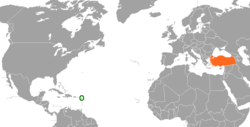
Antigua and Barbuda is a sovereign island country in the West Indies in the Americas, lying between the Caribbean Sea and the Atlantic Ocean. It consists of two major islands, Antigua and Barbuda separated by around 40 km (25 mi), and smaller islands. The permanent population number is about 97,120, with 97% being resident on Antigua. The capital and largest port and city is St. John's on Antigua, with Codrington being the largest town on Barbuda. Lying near each other, Antigua and Barbuda are in the middle of the Leeward Islands, part of the Lesser Antilles, roughly at 17°N of the equator.
The history of Antigua and Barbuda covers the period from the arrival of the Archaic peoples thousands of years ago to the present day. Prior to European colonization, the lands encompassing present-day Antigua and Barbuda were inhabited by three successive Amerindian societies. The island was claimed by England, who settled the islands in 1632. Under English/British control, the islands witnessed an influx of both Britons and African slaves migrate to the island. In 1981, the islands were granted independence as the modern state of Antigua and Barbuda.

Barbuda is a small island located in the eastern Caribbean forming part of the sovereign Commonwealth nation of Antigua and Barbuda. It is located north of the island of Antigua and is part of the Leeward Islands of the West Indies. Antigua and Barbuda gained full independence on 1 November 1981 as a constitutional monarchy within the Commonwealth of Nations. The island is a popular tourist destination because of its moderate climate and coastline.
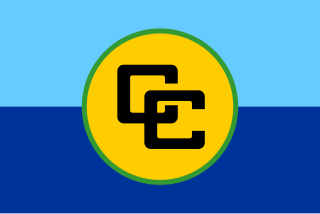
The Caribbean Community is an intergovernmental organisation of 15 member states throughout the Caribbean having primary objectives to promote economic integration and cooperation among its members, to ensure that the benefits of integration are equitably shared, and to coordinate foreign policy. The organisation was established in 1973. Its major activities involve coordinating economic policies and development planning; devising and instituting special projects for the less-developed countries within its jurisdiction; operating as a regional single market for many of its members ; and handling regional trade disputes. The secretariat headquarters is in Georgetown, Guyana. CARICOM is an official United Nations Observer beneficiary.
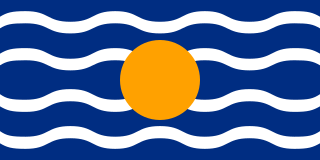
The West Indies Federation, also known as the West Indies, the Federation of the West Indies or the West Indian Federation, was a short-lived political union that existed from 3 January 1958 to 31 May 1962. Various islands in the Caribbean that were part of the British Empire, including Trinidad and Tobago, Barbados, Jamaica, and those on the Leeward and Windward Islands, came together to form the Federation, with its capital in Port of Spain, Trinidad and Tobago. The expressed intention of the Federation was to create a political unit that would become independent from Britain as a single state—possibly similar to the Canadian Confederation, Australian Commonwealth, or Central African Federation. Before that could happen, the Federation collapsed due to internal political conflicts over how it would be governed or function viably. The formation of a West Indian Federation was encouraged by the United Kingdom, but also requested by West Indian nationalists.

The United Nations Economic Commission for Latin America and the Caribbean, known as ECLAC, UNECLAC or in Spanish and Portuguese CEPAL, is a United Nations regional commission to encourage economic cooperation. ECLAC includes 46 member States, and 13 associate members which are various non-independent territories, associated island countries and a commonwealth in the Caribbean. ECLAC publishes statistics covering the countries of the region and makes cooperative agreements with nonprofit institutions. The headquarters of ECLAC is in Santiago, Chile.

The University of the West Indies (UWI), originally University College of the West Indies, is a public university system established to serve the higher education needs of the residents of 17 English-speaking countries and territories in the Caribbean: Anguilla, Antigua and Barbuda, The Bahamas, Barbados, Belize, Bermuda, British Virgin Islands, Cayman Islands, Dominica, Grenada, Guyana, Jamaica, Montserrat, St. Kitts and Nevis, St. Lucia, St. Vincent and the Grenadines, Trinidad and Tobago, and Turks and Caicos Islands. Each country is either a member of the Commonwealth of Nations or a British Overseas Territory. The aim of the university is to help "unlock the potential for economic and cultural growth" in the West Indies, thus allowing improved regional autonomy. The university was originally instituted as an independent external college of the University of London.

Antigua, also known as Waladli or Wadadli by the native population, is an island in the Lesser Antilles. It is one of the Leeward Islands in the Caribbean region and the main island of the country of Antigua and Barbuda. Antigua and Barbuda became an independent state within the Commonwealth of Nations on 1 November 1981.
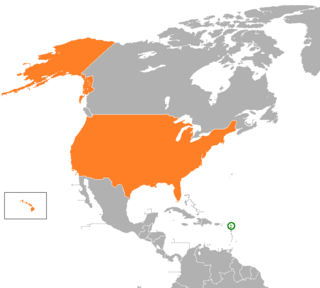
Relations between Antigua and Barbuda and the United States have been friendly since Antigua and Barbuda's independence from the United Kingdom in 1981.

This article deals with the diplomatic affairs, foreign policy and international relations of Barbados.

Antigua and Barbuda maintains diplomatic relations with the United States, Canada, the United Kingdom, and the People's Republic of China, as well as with many Latin American countries and neighbouring Eastern Caribbean states. It is a member of the United Nations, the Commonwealth of Nations, the Organization of American States, the Organisation of Eastern Caribbean States, the Bolivarian Alliance for the Americas, Petrocaribe and the Eastern Caribbean's Regional Security System (RSS).

Barbados–Trinidad and Tobago relations refer to bilateral relations between Barbados and Trinidad and Tobago. Barbados maintains non-resident representation to Port of Spain, and the Republic of Trinidad and Tobago maintains non-resident representation to Bridgetown. Barbados and Trinidad and Tobago formally established diplomatic relations on Barbados' national date of independence 30 November 1966. Both countries are members of many shared organisations including: The Association of Caribbean States, the Commonwealth of Nations, CARICOM, CARIFORUM, and the Community of Latin American and Caribbean States.
Saint John or St. John sometimes refers to John the Apostle of the Bible, but often, especially in church and place names, refers to John the Baptist.
Julian Ernest Chetvynde Rogers MBE is a Caribbean broadcaster and journalist. He has worked as broadcast manager, TV and radio host and producer, publisher, trainer, lecturer, media consultant and public relations professional. Involved since the 1970s with the building of national radio stations notably in Barbados, St Kitts & Nevis, and Antigua & Barbuda, and part of "the original team set up to 'revolutionise' the media industry in Trinidad & Tobago with the rebranding of the Trinidad and Tobago Television Company (TTT) into CNMG", he has been called "the Caribbean man" and has established a reputation as one of the region's most respected media practitioners. His characteristic style as a broadcaster is to conduct biting interviews; one commentator refers to "the persistent journalistic exploits of a resurgent, sharp-witted and emphatic Julian Rogers".
Dame Bernice Lake QC was an Anguillan-born jurist and legal scholar whose career spanned more than forty years. In 1985, she became the first woman from the Eastern Caribbean to be appointed Queen's Counsel. Lake was also the first graduate of the University of the West Indies to receive the honor.

Federal elections were held in the West Indies Federation for the first and only time on 25 March 1958. The result was a victory for the West Indies Federal Labour Party, which won 25 of the 45 seats in the House of Representatives.

Dame Gwendolyn Tonge, DCN, OH, MBE was an Antiguan teacher and home economics expert. After teaching for many years, she became the head of the government Women's Desk, the precursor to the Directorate of Gender Affairs. Appointed as a Senator, she continued to work in the Ministry of the Prime Minister, responsible for policies on women's issues. As Auntie Gwen, she hosted a cooking show Cooking Magic, which began airing on the Antigua and Barbuda Broadcasting Service (ABS) in the 1960s until her death, the longest running television series in the eastern Caribbean, other than news programs. The recipient of many awards, she was honored with the Order of the British Empire, the Order of Honour of Antigua and Barbuda, Distinguished Order of the Nation.
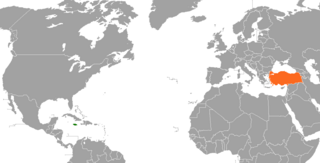
Jamaica–Turkey relations are foreign relations between Jamaica and Turkey.
